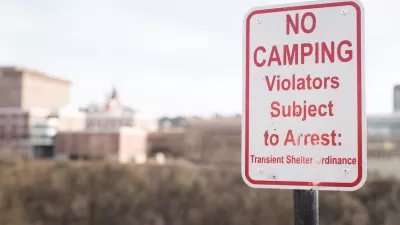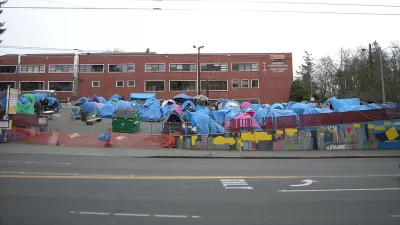A report released today shows that the federal government has been effective in reducing homelessness over the last several years, but will fall short of goals for eradicating homelessness among the most vulnerable populations.
First the good news. Annie Lowrey dicusses the conclusions of an annual report to Congress prepared by the that shows, "[t]he number of chronically homeless people — a particularly at-risk population often in need of mental and physical health services and other safety-net support — fell about 7 percent in 2011 and more than 19 percent since 2007. Homelessness among veterans declined more than 7 percent in 2011 and 17 percent since 2009."
Against the backdrop of the Great Recession, these gains are particularly impressive. "Indeed," says Lowrey, "the number of people counted as homeless has fallen for four out of the past five years. It is now about 6 percent lower than it was five years ago. Many poverty experts anticipated that homelessness would increase during the recession, and many were surprised that it did not."
Despite the gains, goals established in 2010 by the United States Interagency Council on Homelessness to end chronic and veteran homelessness by 2015, and homelessness among families, the young and children by 2020 are unlikely to be met. “They have set ambitious goals for themselves, but I don’t think those are goals that aren’t doable,” said Nan Roman, the president of the National Alliance to End Homelessness. “But not at the rate that we’re going.”
A least part of the reason for the recent declines can be attributed to a $1.5 billion infusion of federal stimulus money that is estimated to have "prevented or ended homelessness for more than one million people." However, notes Lowrey, "with emergency stimulus financing at its end, experts worry that homelessness might increase for some vulnerable groups in the coming year."
FULL STORY: Homeless Rates in U.S. Held Level Amid Recession, Study Says, but Big Gains Are Elusive

Maui's Vacation Rental Debate Turns Ugly
Verbal attacks, misinformation campaigns and fistfights plague a high-stakes debate to convert thousands of vacation rentals into long-term housing.

Planetizen Federal Action Tracker
A weekly monitor of how Trump’s orders and actions are impacting planners and planning in America.

San Francisco Suspends Traffic Calming Amidst Record Deaths
Citing “a challenging fiscal landscape,” the city will cease the program on the heels of 42 traffic deaths, including 24 pedestrians.

Defunct Pittsburgh Power Plant to Become Residential Tower
A decommissioned steam heat plant will be redeveloped into almost 100 affordable housing units.

Trump Prompts Restructuring of Transportation Research Board in “Unprecedented Overreach”
The TRB has eliminated more than half of its committees including those focused on climate, equity, and cities.

Amtrak Rolls Out New Orleans to Alabama “Mardi Gras” Train
The new service will operate morning and evening departures between Mobile and New Orleans.
Urban Design for Planners 1: Software Tools
This six-course series explores essential urban design concepts using open source software and equips planners with the tools they need to participate fully in the urban design process.
Planning for Universal Design
Learn the tools for implementing Universal Design in planning regulations.
Heyer Gruel & Associates PA
JM Goldson LLC
Custer County Colorado
City of Camden Redevelopment Agency
City of Astoria
Transportation Research & Education Center (TREC) at Portland State University
Jefferson Parish Government
Camden Redevelopment Agency
City of Claremont





























